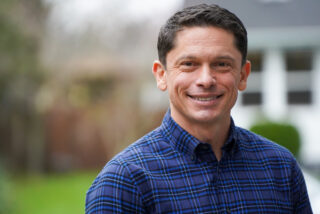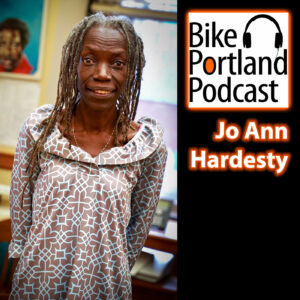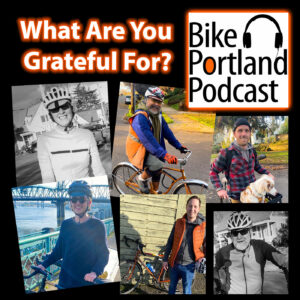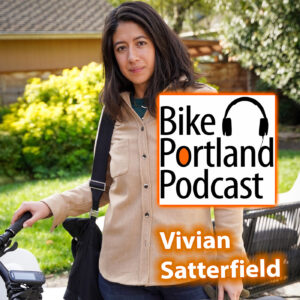[Find it on Apple Podcasts, Spotify, and many other services.]
Last week we shared an interview with Portland City Commissioner Jo Ann Hardesty. This week we hear from one of the candidates who wants her seat: Vadim Mozyrsky.

Mozyrsky is an administrative law judge who specializes in disability law (and sees improving city policy for people with disabilities as one of his top priorities if elected). He lives in the Goose Hollow neighborhood and, while he’s a newcomer to local politics, he’s well-known in civic circles for his service on a number of committees and commissions. Mozyrsky is currently a member of the Portland Charter Commission, that’s looking into changing Portland’s form of government; and the Portland Committee on Community Engaged Policing, a group charged to be a liaison between the community and the Portland Police Bureau. Mozyrsky is a former member of the Citizen Review Committee, formed by the City of Portland in 2001 to improve police accountability; the Portland Commission on Disability (now defunct); and the Portland Public Safety Action Coalition.
Like many of you, before last week I didn’t know much at all about Mozyrsky. He contacted me out of the blue when a mutual friend of ours suggested I could help him learn a bit more about transportation issues in Portland. I agreed to meet him for an informal chat, and after we had an interesting conversation over coffee on NW 23rd Street last week, I invited him into our studio to record something on the record.
Advertisement
We talked about his personal story as an immigrant from Kiev, Ukraine and how he more recently escaped Houston’s terrible traffic for the walkable and bikeable streets of Portland. Mozyrsky also explained his ideas on how to boost bicycling and reduce driving, how to improve policing and law enforcement, how tackle Portland’s homelessness crisis, his style of leadership, and much more.
A few notable moments from this episode:
“Culture dictates policy“, in response to a question about whether or not Portland’s 25% bicycle mode share goal is possible. Mozyrsky said he believes the role of council is “governing by culture” as much as policy. “Over the last few years, that [biking] culture has unfortunately fallen by the wayside. We’ve had politicians in the past, Blumenauer, Sam Adams, that have sort of raised that culture and made it a focal point of policy making. That’s what we need to reinvigorate…”
“I wouldn’t say I’m pro-police. I’m pro victim’s rights,” in response to a question about his strong support for more police officers. “We’re seeing a breakdown in the system right now… People who are in danger, people who have needs, we need to make sure that those needs are addressed. And if a crime is taking place, we need to make sure that someone arrives there and helps those individuals out.”
“Instead of governing by an ideology, I will govern by listening,” in response to a question about how he would reach out to people who didn’t vote for him if he was elected. “It’s been a hard couple years. Let’s bring people together and fix the problems that we have.”
“I think that’s not forward looking. That’s backwards looking,” in response to a question about how he might use PBOT to impact the homelessness crisis, Mozyrsky said one of the problems are that bureaus are currently very siloed. Mozyrsky seems to prefer a shift to having a city manager which would free up commissioners to do legislation, instead of run bureaus (which he likens to corporations). “There’s not enough time to govern. The only person that’s for our current form of government is my opponent. And I think that’s not forward looking. That’s backwards looking.”
You can view the full transcript here or peruse the PDF below…
[pdf-embedder url=”https://bikeportland.org/wp-content/uploads/2021/12/pod-vadim-final.pdf”]
This episode was recorded on December 4th, just five days after he filed his paperwork with the city elections office.
You can follow Mozyrsky at his campaign website, VoteVadim.com.







Thanks for reading.
BikePortland has served this community with independent community journalism since 2005. We rely on subscriptions from readers like you to survive. Your financial support is vital in keeping this valuable resource alive and well.
Please subscribe today to strengthen and expand our work.
Seems reasonable enough. I haven’t heard much about Vadim’s campaign, but will keep an eye (ear?) out for more details.
Friends, do not be distracted by this candidate’s three bikes. There’s a lot more at stake in this election.
Mozyrsky has figured out that it’s not good to say you’re pro-cop. But he is an advocate for increasing the police bureau budget. And here’s the longer quote from that city council hearing on police funding that he highlights on his own website: “You would not cut the firefighter budget in the middle of a raging inferno with the promise that fewer fire fighters will somehow result in fewer fires. We are in the midst of such an inferno. When casting your vote, think of crime victims and their families.”
I’m not sure how you spin that as anything other than pro-cop. This guy is pro-cop. More cops will not make Portland safer.
I’m in favor of an all-of-the-above strategy towards fixing the lawlessness that has overtaken our city. You make it sound as if more/better policing is a bad thing. I disagree, as do (I suspect) a very solid majority of Portlanders.
Anyone running on an anti-policing platform without a very clearly articulated and plausible alternate solution is not going to fare well in November.
Totally agree. This city feels unsafe and voters are going to speak loudly in the next election if candidates run on that platform
Did you listen to the podcast? Because they discuss the firefighter quote you provided (from a year ago when city council voted against Jo Ann’s cut to the police budget). In fact they discussed public safety at great length, including alternative models to policing.
In any case, this seems to be a single-issue election for you: pro-police or anti-police. Jo Ann seems to have changed her stripes recently and is touting her efforts to save police jobs, so I’m not sure how you square that circle.
Speaking for myself only, I don’t understand the logic of cutting police when crime is low but then doubling down and cutting the police again when crime is at an all-time high. I’m open to any solutions to this historic murder rate we’re seeing, and I certainly hope our elected officials are open to discussing all options when it comes to life-and-death decisions.
Hardesty is going to lose this election.
I ride my bike year round. I have read Bike Portland daily for 15 years.
And I’m 100% voting FOR Joann Hardesty to get REelected.
A lot of conservatives are going to be heart broken on election day
You seem to be under the impression that it is only conservatives who think things need to change at City Hall. If so, you may have misread the situation.
More Portland cops does not equal more safety.
More social workers, more services for Portlanders in need, more wealth equity, more jobs programs, more after school programs, etc all DO mean more safety.
Do not give Portland police more money. They already take WAY MORE than they should from the city.
Thank you for bringing Vadim’s campaign to our attention. It will be important for Vadim to understand the issues surrounding biking and people-centered design as he ramps up his campaign.
So, I invite Vadim (and all other candidates and sitting commissioners) to join the Saturday Farmers Market Rides to the PSU Farmers Market. This is a low stakes environment with all-ages and all-abilities of riders kept in mind. It’s also a great opportunity to experience our bikeways and understand how we can make cycling in Portland safer and more convenient.
Shift calendar link to the #PDXMarketRides: https://www.shift2bikes.org/calendar/event-14347
He understands we need a more responsive and modern city government. He understands a well-functioning police force, that is firmly under the disciplinary control of the civilian government, is essential to a safe community. He is clearly civic-minded and engaged with the issues of the day. I think he is right about how the median Portlander feels about how we need more police, who are better equipped to handle the varied needs of the community, while being truly held to account. I don’t think the number of police officers is causally related to the level of crime in a given place, but Vadim is right, when talks about how the average citizen deserves to have a responsive emergency system and a responsive city government, and that perceptions of safety matter. I’m glad he is running and will pay attention to him going forward. No elected official should be unopposed in their bid to remain in power. Vadim has stepped up, and hopefully some others will too. Depending on how the race develops I may vote for Hardesty again.
This only makes it more disappointing to me that he’s championed an inferior voting alternative (RCV) over a marked improvement (STAR – this was…two charter commission election sub-committee meetings ago, IIRC).
Fully agree with this, though. I want even my favorite electeds to feel heat.
Not sure how the “cops don’t prevent crime” narrative slipped in here or how it’s different from advocating for protected bike lanes that measurably don’t really improve anything but the perception of safety.
Respectable people can differ on their feelings of safety around police but I don’t feel like there’s as much room for opinion about the Candyland of posts and paint for bicycling. Put me down as ambivalent to both in any case.
I’ve been thinking about the argument Jonathan makes in the interview that seems to be the basis of the “more police doesn’t equal less crime”. As presented, some folks have looked at historical data comparing the levels of policing and the levels of crime in Portland. Based on that look back they determined that there’s no correlation between police levels and crime rates.
That analysis seems like a very flawed way to analyze our current situation and what we’re seeing now in terms of both policing levels and crime is unprecedented. As Vadim notes, people should be able to expect that a call to 911 will get some sort of response, which is not happening now and is seemingly entirely without precedent in the Rose City.
For example, my girlfriend was in her townhouse in the Richmond neighborhood last year when two people were at the front door trying to break in at 2am. She called 911 and was told that the police might be able to do a drive by 30 minutes later. Worth noting: That night there was a protest at the East Precinct and it was one of those where arson was involved.
We now know that calling 911 will get you a hold time of about 5 minutes, or longer depending on the day. The likelihood that you can get a police response to a violent threat in a timely manner is really low right now. I really struggle to see how the historical look back on correlation has much to say about the situation that we’re in right now and seems like a very shaky argument.
I also notice that Jonathan doesn’t really respond in the interview to Vadim’s assertion that people should have an expectation that they can get a timely response if they call 911. I know there are people that will say the police are just slowing down and they should be able to respond at the same rate as before. But staffing levels fell to unprecedented lows and the workload of responding to shootings and psychotic breaks are at unprecedented historical highs.
I’m all for alternatives like Portland Street Response, but really, what are we supposed to do when there are two people breaking into a house at 2am? I’d really like for Joan and Jonathan and the others who say police aren’t the solution to tell me what the response should be at that point.
VS,
I appreciate your thoughtful comment but you are making a very huge assumption about my beliefs that is simply untrue.
I have a complicated role to play when being the editor and interview host – especially when it comes to very tricky and sensitive issues like policing. And an interview can be a strange beast itself for various reasons, so please don’t make assumptions of my personal beliefs based on what you hear in one conversation in this context.
I cannot speak for Commissioner Hardesty. You can learn about her beliefs with a simple google search.
To your question: I am very skeptical and disturbed by the institution of policing and especially the PPB, given the myriad sketchy and unjust things they’ve done over the years. Given my personal distrust and dislike of how they wield their authority, I also have respect for police in some contexts and have maintained relationships with police officers in the PPB over the years whom I trust and respect. Like I said, it’s complicated! And we live in a moment where I feel like folks see this conversation through the lens of a lazy and divisive binary where someone must be either a pro-cop bootlicker/fascist or an abolitionist cop-hater. I’m somewhere inside that spectrum but I am not on either side. Hardesty is on that spectrum too — probably a bit to my left — and Mozyrsky is on that spectrum to my right. The magic – which I’d define as a place where we can work together to make progress on this crisis in the short-term and work on wholesale reforms in the short and long-term — is somewhere on this spectrum.
The thing about police and the PPB is that they have not been good stewards of their authority IMO. I believe we need a strategic and professional police force where “bad apples” are never tolerated and bad behavior is nonexistent because of cultural peer pressure and institutional standards. And yes, when people are in danger, in this moment, I believe we need police to respond to that. I also agree with Hardesty that the PPB needs to earn our trust if they want our money and we must create a culture where people are more afraid of criminals than they are of the police. Right now many people fear both, and with good reason IMO.
Again, please don’t assume you know my beliefs on things based on what you read in a story (unless it’s an op-ed!) or hear on the podcast. Thanks!
I wasn’t trying to assume what you believe, I was responding to a concept you gave voice to in this statement by you in the transcript at 28:30:
“So that concern about crime that you hear from people or about that concern about policing you hear from people a lot is really it seems to me like it’s because our entire culture is sort of soaked with this narrative that more police equals less crime. And there’s no real data that supports that. There’s recently been data that I’ve seen a lot of people reading. And I’ve read myself here in Portland that shows that if you look over time at the police bureau budget, that’s actually not the case. So as their budget’s gone up and if they’ve added officers, it hasn’t really had a big impact on crime.”
And I meant Joan the commenter here, not Commissioner Hardesty. I believe that you, Joan and One all gave voice to the assertion: “More cops doesn’t equal less crime.” I was trying to respond to that assertion/argument by saying a historical look back to past PPB budgets and crime stats isn’t a solid way of analyzing what’s happening currently, because: 1) demands for police responses are way up over historical ranges and 2) police staffing is way down compared to the historical ranges.
What I wrote was, “the argument Jonathan makes” which is different from saying, “what Jonathan Believes”. I think it’s fair game to respond to the concepts that come up in an interview and talk about the ideas. You gave voice to a concept that seems to have some adherents and I think it’s a flawed belief.
thanks for clarifying. yes your feedback is totally fair. i appreciate it.
Is there a city bureau or other local agency that is a good steward of its authority? Our education system fails our kids, our housing system has people living on the street, and our transportation system lets them die there.
We need things. More teachers, social workers, housing, safe streets, and conversations that are only as popular as they are far away from a given person’s back yard. We don’t have them now and may not ever.
It’s don’t think it’s enough to believe that if we de-fund our police to re-fund our communities then the rest will just follow. We can kick out the leg of police, but means alone won’t put enough underneath to replace it, and I don’t think we have the resolve.
I used to work for Judge Mozyrsky at SSA, not in a supervisory capacity but as part of the decisionmaking workflow. I wasn’t there very long and I worked with all the judges, so I don’t have an intimate sense for his politics or ideology. But I can say that he was one of the kindest and most thoughtful judges there, and I always respected his decisions (as opposed to several other judges).
In 2019, Vadim denied 51% of the disability cases presented to him. In 2020, he denied 38% and dismissed 25% of the cases. His approval rate for disability cases has never been above 38% in his career. He does not advocate for people with disabilities and perpetuates poverty and homelessness.
Jonathan,
Can you do an interview with Rene Gonzalez?
Hi Quintin. Yes I can. I’ve been thinking about it and am in touch with his campaign. Thanks for the suggestion.